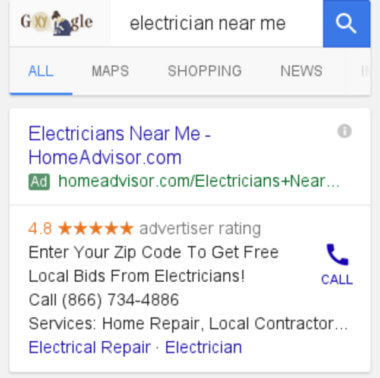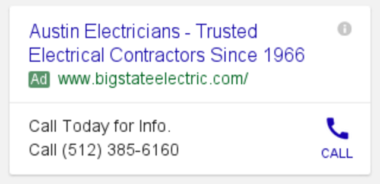Local search has changed a lot over the past few years.
Two years ago, Google released the “Pigeon Update,” which profoundly affected how local search results are calculated. Then, about a year ago, Google revealed that mobile searches finally outnumbered desktop searches. In light of this shift, Google made mobile-friendliness a key ranking factor for mobile search.
Most recently, Google introduced Promoted Pins at their 2016 Summit, to give advertisers a greater ability to capitalize on the potential of local mobile searches.
Can you see where all this is going?
The days of desktop local search optimization are ending. If you want your business to rank effectively for local searches, it’s time to focus your efforts on mobile.
Understanding Your Mobile Audience
When it comes to local search, your mobile audience is often very different from your desktop audience.
Given the size and weight of desktop computers (and even laptops), most desktop searches happen at home or at work. As a result, desktop local searches have a delayed search intent.
Maybe they’re planning a vacation in your area. Maybe they’re making dinner plans for the weekend. Maybe they are just checking to see if there are any local businesses that have the product or services they need.
They might be interested in your business, but they probably won’t be headed your way in the next 15-30 minutes.
On the other hand, most mobile local searches come with an immediate search intent. People are searching on their mobile phone because they want something now!
To optimize for local search on mobile, you need to focus on that immediacy. Give mobile searchers the simple, easy, readily accessible answers they are looking for and you’ll win their business.
Optimizing for Local Search
So, how do you provide the kind of immediate results your mobile audience is looking for? For this article, we’re going to assume that you’ve already covered the local search basics (claimed your business listings, built backlinks, reputation management, etc).
Instead, let’s take a look at how you can optimize for local search for both organic and paid search:
Organic Search
People search differently on mobile than they do on desktop. Not only are they looking for something they can immediately act on, but they also avoid lengthy searches—let’s face it, phones can be a pain to type on!
So, if you want to show up for mobile searches, you typically want to optimize for shorter keywords or phrases and design your site to provide an optimal mobile experience.
What Keywords Should You Be Targeting?
To determine which keywords you want to optimize for, you’ll need to do a little research. Online keyword research tools like the AdWords Keyword Planner or Moz’s Keyword Explorer can be helpful here, but remember, these tools aren’t designed around mobile-specific queries.
The easiest way to get a feel for how people would look for your business is to just ask them, “What would you type in if you were looking for [whatever your business does that you want to rank for].” The responses will be incredibly insightful.
Later, you can sync your Google Webmaster Tools with Google Analytics to see exact search queries in the Google Search Queries section of analytics.
If you are currently running PPC ads, you can see exactly how people encounter your ads on mobile using your Search Terms report.
Simply open your AdWords account and click on Keywords. Click on Search Terms and then click the Segment dropdown menu. Select Device.

This will give you a list of exactly which keywords and keyword phrases people are using on their mobile devices that trigger your ads. Identify the search terms that are relevant to your local business efforts and you’ve got your keyword list!
Optimizing Your Pages for Local Searches
Once you know which keywords and phrases you want to rank for, you’ll want to identify which pages you want to rank for those keywords. At a minimum, those pages should have at least 300-500 words of text relating to the keyword.
In general, more text makes the search engines happy, but you have to remember, your searchers are searching for you on mobile, so your target audience is looking for quick, relevant information.
People are a lot less patient with their mobile experience than they are on desktop, so if it comes down to UX vs GBX (Google bot experience), optimize your UX first.
Remember, Google is trying to identify the pages that will make searchers the happiest, so if your searchers are happy with your page, Google will be, too.
Since the goal is to get these pages to rank for local mobile searches, it’s important to include your keyword and location (for example, “Fresh Mexican Food in Lindon, Utah | Joe’s Taco Shop”) in the following places:
- Title Tag
- Page title (h1-tag)
- Content
- Alt text on your images
Also, your name, address, and phone number should be part of your header, footer, sidebar, or some other element of your site that shows up on every page. Google uses your address and phone number to determine the relevance of your site to local searches
Optimizing Your Site for Local Searches
Finally, if you want to create a positive experience for your mobile site visitors, your site needs to provide a great mobile experience in two areas:
1. Page Load Time
When it comes to page load time, people are typically more patient on mobile than they are on their desktop computers. That being said, 49% of mobile users expect a page to load within 10 seconds. 19% of mobile users will abandon a site if it takes more than five seconds to load.
If your goal is to create a frictionless experience for your mobile users, fast load times are your friend. To check your mobile load time for specific mobile devices, click here. For tips on improving your mobile load times, click here.
2. Mobile-Friendliness
There are a couple of ways to evaluate how mobile-friendly your site is. If you’re worried about “Mobilegeddon” fallout, you can see how Google views the mobile-friendliness of your site here.
Mobile-friendliness isn’t just about pleasing the Google bots, however. If you really want to know whether or not your site is easy to use on mobile, ask people to test out your site.
Talk to some friends, family, or coworkers who haven’t used the site before and ask them to do specific things on your site—the sorts of things you want your potential customers to do. Then, talk to them about the experience.
Are there hiccups, missing pieces or frustrating aspects to your site? A little user feedback can go a long way towards improving your mobile experience.
Paid Search
Organic results may not be the only way people find you in their local searches. If you’re advertising on AdWords or other paid search platforms, you also need to optimize your local paid search strategy.
There are three main things to consider:
1. Do Your Ads Feel Local?
One of the easiest ways to improve the performance of your local paid search ads is to include local elements in your ad copy.
For example, if I’m in Austin, Texas, and my electrical system goes up in smoke, I might search for “electrician near me” on my phone.

Unfortunately, an ad like this doesn’t do much to address my urgent need for an electrician. Sure, the ad says I can get “Local Bids From Electricians”, but I have to enter my zip code just to get bids—I need help now!
On the other hand, an ad like this is a lot more likely to get my click or call:

The simplest way to make your business seem local is to include the location of your audience in your copy.
Of course, to do that, you need to either break out your campaigns by the specific locations you want to mention in your copy or use dynamic keyword insertion to put the location in your copy.
Either way, pairing location-specific ads with a location-specific landing page is an excellent way to get more results from local searches.
2. Are You Using Mobile Ad Extensions?
There are several ad extensions that are particularly useful for local mobile searches:
- Location Extensions: Location extensions are an obvious must for local searches. Your potential customers are looking for someone local, so show them you are local.
- Sitelinks. You can use sitelinks to highlight specific local information on your site like “call us” or driving directions.
- Call Extensions. Call extensions are perfect for any mobile campaign, but they are especially useful if you are in an industry where people want to call in advance. For example, if you have a restaurant, a call extension makes it easy for people to check and see if you have a table available before they drive over.
- Click-to-Call Ads. Depending on your business, click-to-call ads may or may not be a good idea. If the goal is to get people to visit your brick-and-mortar location, click-to-call ads may make it hard to figure out where you are. On the other hand, if you want people to call you, this can be an incredible option.
Overall, the right mobile ad extensions can dramatically improve the effectiveness of your local search campaigns.
3. Are You Using Promoted Pins?
The newest update to advertising on Google Maps should give marketers an excellent way to increase the visibility and accessibility of their business in local searches.
Promoted Pins put your logo directly on the Google Map, which is great for companies with a solid brand. Even for less well-known brands, this new option should help make your local business stand out more.
Additionally, Google is giving advertisers the option to customize your results page with special in-store promotions and the ability to search a particular store’s local inventory (for retailers).
Since 33% of people who are searching online end up making a purchase at a brick-and-mortar location, Promoted Pins and customized pages can be an excellent way to drive more local business through your doors.
Promoted Pins haven’t rolled out to all advertisers yet, but once they are available to your business, you should take advantage of this update.
Summary
To successfully optimize for local search on mobile, you need to understand what makes your mobile searchers tick. Your mobile audience wants easy results now.
Give them what they’re looking for and you’ll win their business.
You’ve heard my two cents; now I want to hear yours. How do you optimize for local search on mobile? Are there additional tactics for either organic or paid search that you would add to this article?
Image Credits
Featured Image: AlphaBaby/DepositPhotos
Screenshots by Jacob Baadsgaard. Taken July 2016.




